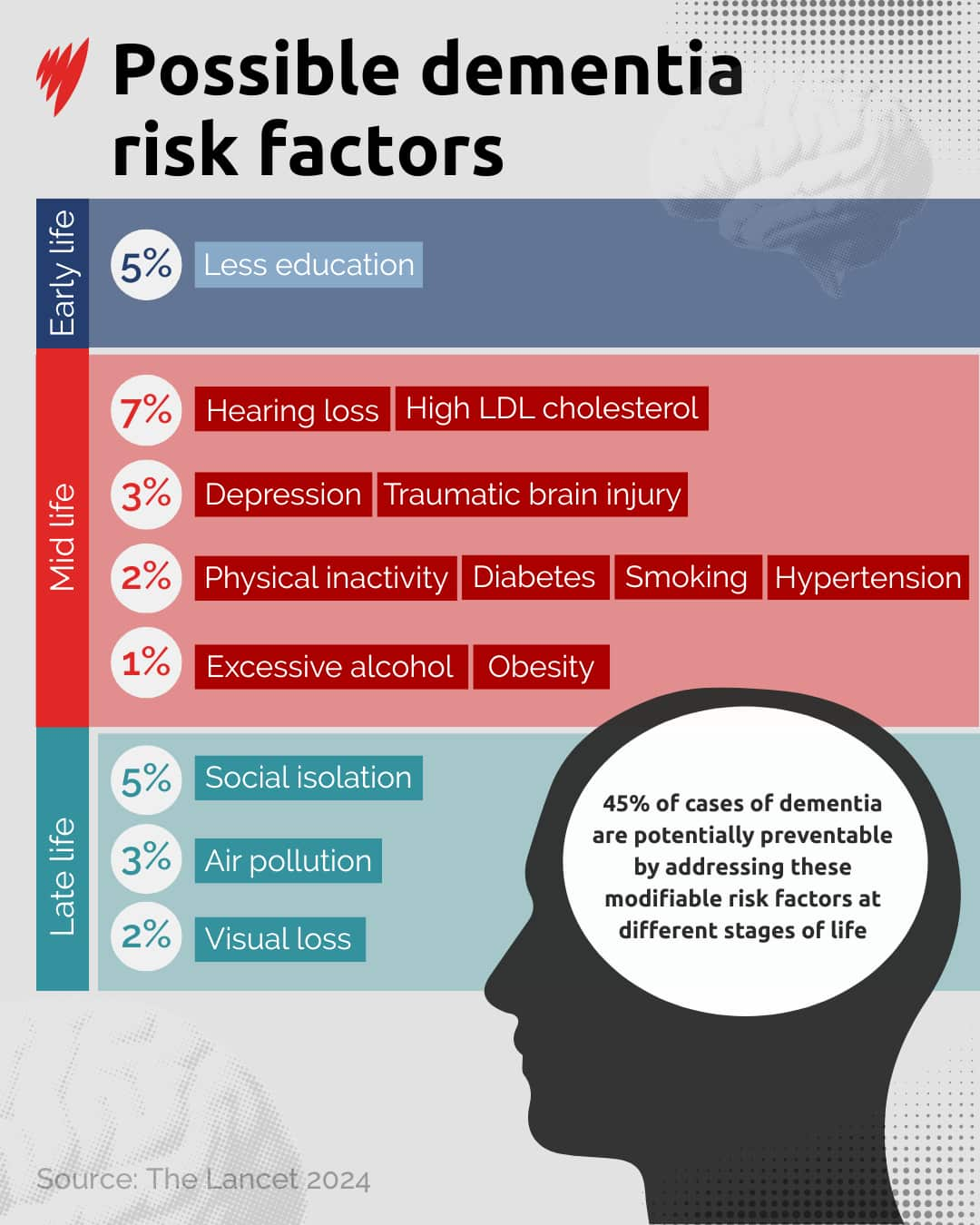Alzheimer’s disease disproportionately affects women — and now a new international project, involving an Australian researcher, has received a $4 million boost to try and find out why.
Professor Kaarin Anstey, the director of the University of NSW's Ageing Futures Institue, and the University of California's Professor Kristine Yaffe have been jointly awarded the funding to investigate the phenomenon of the disease, which some health bodies place as among Australia's leading causes of death.
Anstey said a lot of research into Alzheimer's — the most common form of dementia — hasn't considered "sex-specific factors".
"We hope that by studying hormonal variability and aspects of women's health that have previously been dismissed, we may uncover clues to explain women's greater risk of Alzheimer's disease," she said.
Why are women more prone to Alzheimer's?
Anstey, whose work is being funded by United States-based charity Wellcome Leap, said there are differences in brain structures between the binary sexes, which could explain the differences in the prevalence of Alzheimer's.
She said there are not enough study participants who identify as non-binary or transgender to have reliable data for those groups.
While there could be a link between an increased risk of Alzheimer's and hormonal changes in women, the reason behind the "imbalance" is unclear.
She said one reason is that Alzheimer's statistics tend not to take sex into account, and treat men and women the same, despite "the large differences in biology and risk of Alzheimer's".
She said there are two main goals for her future studies.
"Overall, the most urgent priority is to learn how to reduce the risk of dementia and slow cognitive decline so that we can develop interventions to prevent it," she said.
"Second, making sure these women's health issues are given the same weight in our research as other factors like cardiovascular disease, so that they are not ignored or dismissed as unimportant," Anstey said.
"We need all the clues and information available to progress the massive task of preventing cognitive decline and impairment in ageing."
Do men and women experience Alzheimer's differently?
Associate Professor Fiona Kumfor from the University of Sydney's Brain and Mind Centre and co-founder of the Dementia Law Network said understanding the differences in how men and women experience Alzheimer's is an "important area for future research".
"There hasn't been a lot of research examining sex differences, but some evidence suggests that women may have more depressive symptoms and changes in beliefs, such as delusions, whereas men may experience more loss in motivation which can lead to apathy," she said.
Because women tend to live longer than men, there is a higher number of women living with Alzheimer's.
Kumfor said that women are also more likely to be diagnosed with Alzheimer's than men.
"Although men are at greater risk of other dementia types like some types of frontotemporal dementia and vascular dementia," Kumfor said.
Are there risk factors for dementia?
Anstey said it's important to look at modifiable risk factors that can improve health outcomes for people with Alzheimer's.
"While we know that many risk factors for dementia are modifiable, the effect of each may not be the same in men and women. The more we can understand, the more we can intervene to prevent it," she said.
The Lancet, a prominent medical journal, has tracked 14 modifiable risk factors in its research into dementia.
The paper's authors state nearly half of all dementia cases worldwide could be prevented or delayed by addressing these risk factors.

The mid-life risk factors include hearing loss, high LDL cholesterol (or 'bad' cholesterol), social isolation and depression.
Managing these risk factors, particularly in the early and middle stages of life, could potentially prevent or delay dementia cases by 45 per cent, according to the research published in 2024.
Some academics have commended The Lancet study, but say it's not possible to conclusively link these risk factors directly to dementia.
Diagnosis and prevention
Professor Scott Ayton, from the Florey Institute of Neuroscience and Mental Health, told SBS News there is a "considerable challenge" around the world when it comes to diagnosing Alzheimer's.
But recent research shows there is an over 90 per cent success rate in diagnosing Alzheimer's by looking at blood-based biomarkers, according to Ayton.
Kumfor said that while most cases of Alzheimer's start with changes in memory, that's not the case for everyone.
"For some people, the earliest changes might be in language, navigation, planning or behaviour," she said.
"Where the presentation is 'atypical', or if people develop symptoms at a younger age — under 65 years old — this can make diagnosis particularly difficult."
While diagnosis continues to be an obstacle in Alzheimer's care, preventing symptoms like memory loss from worsening is also a focus for researchers.
Ayton said two drugs are now available in Australia — donanemab and lecanemab — which could help people with cognitive decline.
However, Ayton said more research is needed to assess the impact of these medications, while there are widely accepted benefits for people with Alzheimer's when they make lifestyle changes.
"What's good for the heart is good for the brain," he said.
"Exercise, heart health and diet are shown to make a difference with prevention."
He said when addressing health concerns, it's "earlier the better" for the best outcomes.
"Hypertension has been shown to increase the risk of developing Alzheimer's. Dealing with hypertension at midlife will have better results than addressing it later on in life," he said.
Kumfor said speaking with psychologists and lawyers early on can help people with Alzheimer's to prepare for long-term challenges.
"Alzheimer's disease is progressive, and people will develop more severe symptoms over time, so it is also important to speak to someone for support and think about future planning," she said.
The information in this article is for general information purposes only and should not be relied on as a substitute for professional medical advice. Readers are advised to consult a qualified health professional for guidance specific to their situation.
For the latest from SBS News, download our app and subscribe to our newsletter.

